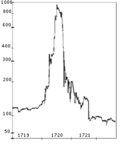Portal:Business
The Business and Economics Portal  Business is the practice of making one's living or making money by producing or buying and selling products (such as goods and services). It is also "any activity or enterprise entered into for profit." A business entity is not necessarily separate from the owner and the creditors can hold the owner liable for debts the business has acquired except for limited liability company. The taxation system for businesses is different from that of the corporates. A business structure does not allow for corporate tax rates. The proprietor is personally taxed on all income from the business. A distinction is made in law and public offices between the term business and a company (such as a corporation or cooperative). Colloquially, the terms are used interchangeably. (Full article...) Economics (/ˌɛkəˈnɒmɪks, ˌiːkə-/) is a behavioral science that studies the production, distribution, and consumption of goods and services. Economics focuses on the behaviour and interactions of economic agents and how economies work. Microeconomics analyses what is viewed as basic elements within economies, including individual agents and markets, their interactions, and the outcomes of interactions. Individual agents may include, for example, households, firms, buyers, and sellers. Macroeconomics analyses economies as systems where production, distribution, consumption, savings, and investment expenditure interact; and the factors of production affecting them, such as: labour, capital, land, and enterprise, inflation, economic growth, and public policies that impact these elements. It also seeks to analyse and describe the global economy. (Full article...) Selected articleFinn Michael Westby Caspersen, Sr. (October 27, 1941 – September 7, 2009) was an American financier and philanthropist. A graduate of Brown University and Harvard Law School, he followed his father, Olaus Caspersen, a Norwegian immigrant to the United States, as chairman and chief executive of Beneficial Corporation, one of the largest consumer finance companies in the United States. After an $8.6 billion acquisition of Beneficial by Household International in 1998, Caspersen ran Knickerbocker Management, a private financial firm overseeing the assets of trusts and foundations. Selected image
Selected economyThe economy of Iceland is small and subject to high volatility. In 2011, the gross domestic product was US$12 billion, but by 2018 it had increased to a nominal GDP of US$27 billion. With a population of 387,000, this is $55,000 per capita, based on purchasing power parity (PPP) estimates. The 2008–2011 Icelandic financial crisis produced a decline in GDP and employment, which has since been reversed entirely by a recovery aided by a tourism boom starting in 2010. Tourism accounted for more than 10% of Iceland's GDP in 2017. After a period of robust growth, Iceland's economy slowed down according to an economic outlook for the years 2018–2020 published by Arion Research in April of 2018. Iceland has a mixed economy with high levels of free trade and government intervention. However, government consumption is less than other Nordic countries. Hydro-power is the primary source of home and industrial electrical supply in Iceland. (Full article...) Selected quote"Human wants and desires are countless in number and very various in kind: but they are generally limited and capable of being satisfied. The uncivilized man indeed has not many more than the brute animal; but every step in his progress upwards increases the variety of his needs together with the variety in his methods of satisfying them. He desires not merely larger quantities of the things he has been accustomed to consume, but better qualities of those things; he desires a greater choice of things, and things that will satisfy new wants growing up in him. Thus though the brute and the savage alike have their preferences for choice morsels, neither of them cares much for variety for its own sake. As, however, man rises in civilization, as his mind becomes developed, and even his animal passions begin to associate themselves with mental activities, his wants become rapidly more subtle and more various; and in the minor details of life he begins to desire change for the sake of change, long before he has consciously escaped from the yoke of custom. The first great step in this direction comes with the art of making a fire: gradually he gets to accustom himself to many different kinds of food and drink cooked in many different ways; and before long monotony begins to become irksome to him, and he finds it a great hardship when accident compels him to live for a long time exclusively on one or two kinds of food." TopicsRelated WikiProjectsDid you know (auto-generated) -
On this day in business history
General imagesThe following are images from various business-related articles on Wikipedia.
More did you know
Business news
SubcategoriesRelated portals
Things you can doUrgent and important articles are bold
WikimediaThe following Wikimedia Foundation sister projects provide more on this subject:
SourcesDiscover Wikipedia using portals |









































